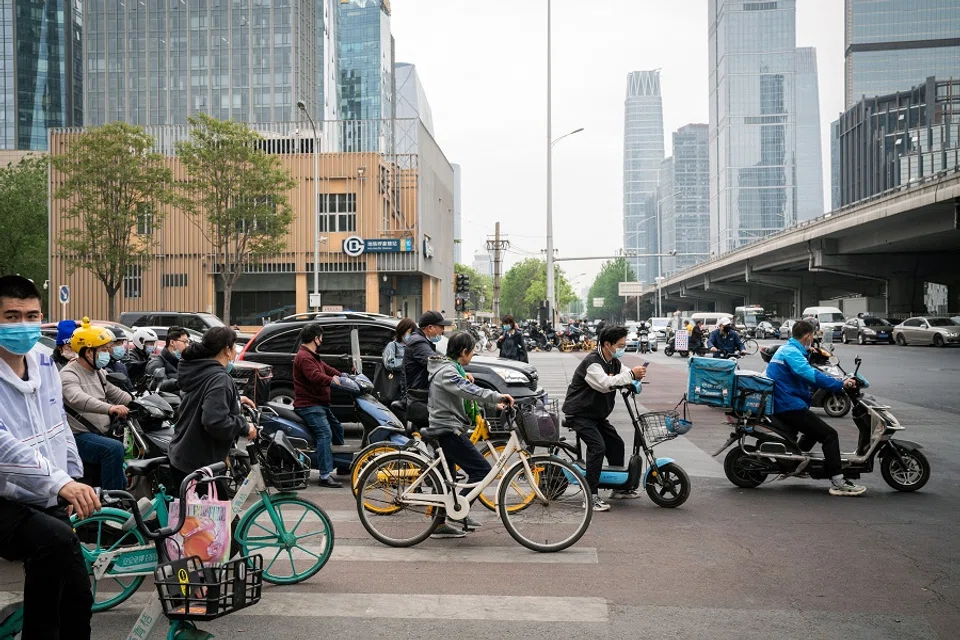No one in the world loves the US as much as the Chinese? Not anymore.

Since diplomatic relations were established between China and the US in 1979, Chinese elites have looked up to the US, regarding it as a role model. They sent their kids there to study, gradually making it the norm for elites to pursue further education in the US. Graduates of top Chinese universities such as Peking University, Tsinghua University and the University of Science and Technology of China saw studying in the US as their ultimate goal. At the start, about 30% of them left for the US after they graduated from their courses. This trend continued in the following years, and by the fifth year, almost all graduates of Chinese elite universities furthered their studies in the US.
China's love affair with America
Former Chinese President Jiang Zemin once said that all ministerial-level officials should have some experience studying in the US. If they did not, they should head to the US for enrichment courses. The Organisation Department of the Chinese Communist Party also signed contracts with American universities such as Harvard, Yale and the University of Maryland to train senior party cadres. Chinese government officials, including township- and county-level cadres, all went to the US for study trips. Returnees worshipped and adored the US. Their admiration resulted in some policies and practices being implemented even if they were not aligned with China's national conditions - after all, this was how the Americans did it.
To some Chinese, the US was equivalent to heaven - how could there be a speck of dust in such a sacred place?
The US experienced a financial crisis in 2008. Back then, US Treasury Secretary Hank Paulson sought help from China, and Chinese Premier Wen Jiabao generously tapped on hundreds of billions of foreign exchange reserves to save the US market and to buy US debt through the purchase of US treasury bonds. When people doubted his decision, Wen said that saving the US is saving China. In the end, hundreds of billions of US dollars went to waste and no one was held accountable for it. All the gains from a trade deficit with the US has been returned to the US through the purchase of US treasury bonds. To some extent, Americans obtained Chinese goods with mere pieces of green paper.

Chinese media and university classrooms were ruled by many in the pro-US camp and had a tendency to brainwash the Chinese. Students protested whenever I talked about the US's problems during my lectures at Chinese universities. To some Chinese, the US was equivalent to heaven - how could there be a speck of dust in such a sacred place? Chinese comedian Brother Sway once said, "No one in the world loves the US as much as the Chinese." Thus, loving the US was non-negotiable. China's policy of "maintaining a low profile and biding its time (韬光养晦)" meant fawning over the US and making it happy by going to war with an old ally Vietnam, keeping a distance from North Korea, and not getting closer to countries out of favour with the US such as Iran, Russia, Iraq, Cuba and Venezuela. China did all these with the aim of steadily developing the country and improving people's lives.
The Trump administration's actions against China has made clear to the Chinese the structural contradictions between the two countries, and have greatly reduced the influence that the pro-American Chinese elite have on public opinion.
When the scales have fallen from China's eyes
Over the past 40 years of reform and opening up, China's economy has grown rapidly and living standards have vastly improved. But the resources in this world are limited. With 1.4 billion people enjoying a raised standard of living, there is a greater demand for natural resources, which threatens the US and the West's high-consumption lifestyle. Former US President Barack Obama once said in an interview with the Australian press that the earth cannot sustain a billion Chinese living like the Westerners, and had wanted to use the Trans-Pacific Partnership (TPP) to contain China.
When former US President Donald Trump took office, China hoped that China-US relations would improve and provided VVIP treatment by closing the Forbidden City for a day to give Trump an exclusive tour of the place. But Trump's hostility towards China exceeded that of Obama's. He gave up on Obama's TPP only because it was deemed to be toothless. Not only that, he bypassed the World Trade Organization, starting a direct trade war with China; sanctioned Huawei and other high-tech companies; interfered in matters relating to Hong Kong and Xinjiang; and blamed China for the Covid-19 pandemic. Former US Secretary of State Mike Pompeo even accused China of committing "genocide" against the Uighurs in Xinjiang.
The actions of the Trump administration have finally made China understand that the US and the West would never allow China to be on an equal footing with them. Even if China has no intention of challenging the US's dominant position, the US would not let China have its peaceful rise. The Trump administration's actions against China has made clear to the Chinese the structural contradictions between the two countries, and have greatly reduced the influence that the pro-American Chinese elite have on public opinion. Government officials who hope to reach a compromise with the US are now on the defensive, while hardliners who favour confronting the US have the upper hand.
Unlike its past practice of lying low and biding its time, China quickly improved its relations with North Korea, inviting its supreme leader Kim Jong-un to visit China on several occasions. Chinese President Xi Jinping also visited Pyongyang for the first time, quickly warming up China-North Korea trade and economic relations. Chinese policymakers who initially wanted to abandon North Korea in the hope of improving China-US relations now realise the importance of China-North Korea relations.

Free to explore other avenues
Numerous strategic complementarities exist between China and Iran on the geopolitical and economic fronts. But in order not to provoke the US, China never openly formed major political and economic relations with Iran. But amid increased US hostility, China is finally realising that deepening relations with Iran would be a good card to play against the US. Thus, a 25-year cooperation agreement between China and Iran was signed on 27 March. This agreement greatly enhances strategic cooperation between both parties, and paves the way for China to gain large volumes of oil from Iran priced and traded in RMB, which would be of great significance to China's future development. At the same time, Chinese investments in Iran will increase, as will the influx of Chinese technology and products into Iran. As a country that has been sanctioned and contained by the US for a long time, this deal is very important to Iran as well.
China is also actively stepping up strategic cooperation with Russia, demonstrating the fact that it is no longer dancing to the US's tune but is formulating its own development strategy. This is perhaps one of the unexpected outcomes of the Trump administration's suppressive tactics against China. As China becomes more aware of the irreconcilable strategic contradictions between the US and itself, it knows it has no choice but to unite with countries also contained by the US in order to safeguard and maintain its development. This would in turn greatly affect the future of global geopolitics.
Related: Clamp down on Chinese students and academics? America's loss is China's gain | The US will accelerate its own decline by suppressing China | The US is helping to unite the Chinese people and the CCP by challenging China's core interests | Chinese academic: China-Iran deal will benefit China, Iran and Middle Eastern countries in the long run
